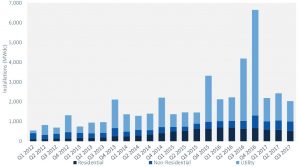Australia
Demand management incentive scheme
The Australia Energy Regulator (AER) has this week released details of its Demand Management Incentive Scheme and the Demand Management Innovation Allowance. The scheme will give more choice to how consumers use their household electricity and solar PV and storage systems by signing up to schemes such as virtual power plants. This will enable distributors and consumers to work closer together to alleviate pressure on the grid. The AER estimates $1bn worth of demand management investment may be realised over 5 years.
Report from the ISF suggests alternatives to AGL Liddell closure plan
The Institute for Sustainable Futures (ISF) from the University of Technology in Sydney (UTS) have released a report showing that energy efficiency measures could reduce the cost of replacing the Liddell coal-fired generator, which is due to close in the next five years.
AGL, who own the generator, have released plans for the replacement which will continue to provide the same amount of capacity using a mix of renewable generation, storage and DSR combined with efficiency improvements of the nearby Bayswater coal generator. The assessment would provide electricity at $83/MWh.
The ISF report considered a clean energy replacement of 1000MW of energy efficiency, 600MW of new wind, 250MW demand response and 200MW of flexible pricing. The report concluded that not only would this reduce carbon emissions to zero but is also the cheapest option.
Power prices set to fall
The Australian Energy Market Commission (AEMC) annual Electricity Price Trends report forecasts that electricity prices in some of the states of the National Electricity Market (NEM) should fall between 5-7% in 2018-19. The report bases these predictions on the large amount of renewable generation that will be coming online (4,900MW) which should ease the wholesale electricity prices.
USA
Summary of California Energy Policy 2017
Greentechmedia’s summary of Californian energy policy in 2017, and the issues it has going forward.
50 US Cities have now pledged to be 100% renewable.
The US now has 50 cities which have pledged to become 100% renewable. This number is rising rapidly, it was 30 in June 2017. If the incumbent utilities of an area do not provide the kind of customer choice municipalities want, then the latter tend to develop community choice aggregation (CCA) programmes. The Sierra Club has just updated via its 2017 report on US cities which have pledged to 100% renewables, and gives in depth discussion of 10 cities.
Solar implementation falls in 2017 in the US

U.S. Quarterly PV Installations, Q1 2012 – Q2 2017
Europe
New report on the German electricity market in 2016
A new report on the German electricity sector from the German regulator, the Bundesnetzagentur (BNetzA), has outlined the decreasing importance of the fixed feed-in-tariff model with only 28% of renewables projects receiving a fixed feed-in tariff in 2016 and 72% of total renewable electricity production funded via a market premium model. Over 93% of onshore and offshore windfarms used the market premium model compared to only 22.6% of solar power production.
Installed renewable capacity reached 99.7 GW by the end of 2016 (up 7.2 % from 2015), driven mainly by onshore wind expansion. However total gross production from renewables actually dropped slightly from 2015 due to low wind speeds in the north of Germany. Whilst lignite is still significant in the energy mix, producing 23% total electricity, gas-fired power plants increased production by 38% in 2016, reversing a trend of decreasing production since 2011.
Germany is the EU’s largest importer of natural gas and demand set to grow further – study
A study by the German Federal Institute for Geosciences and Natural Resources (BGR) has suggested that the Energiewende is likely to significantly increase demand for natural gas in Germany. Germany is already the EU’s biggest importer of gas accounting for almost 25% of EU natural gas imports with imports increasingly coming from sources outside of the EU such as Russia and the Middle East.
‘World’s tallest’ wind turbine gets 70MWh of pumped storage near Stuttgart
An onshore wind turbine of 246.5 metres is under construction near Stuttgart in Southern Germany and will be sited with 70MWh of onsite pumped hydro energy storage. The turbine, billed as the world’s tallest on-shore wind turbine, is being installed as part of a four turbines development at an existing wind farm by Max Bögl Wind. The tallest turbine stands in a natural reservoir which adds 40 metres to its height and allows water to be stored before it is dropped downhill into another pool, generating electricity in the process. Each added metre of height can add between 0.5% and 1% to the expected annual energy yield of wind farms while higher hubs mean less wind turbulence.
Should blockchain be regulated?
An article this week suggests that in order for blockchain, and the numerous business models that are using the technology for energy, to become standardized, there is a need for regulation. The author suggests that in order for scalability then institutional and legal certainty needs to be harmonised. However, the approach of the regulator needs to achieve the correct balance between ‘a light touch’ and smart regulation – essentially making sure regulation allows viable new ideas and business models to achieve maturity.
Franco-Iberian summit on interconnectors.
Portugal is to host a mini-summit early next year together with Spain and France to address the longstanding isolation of the Iberian peninsula from the rest of Europe’s electricity grid. Spain is keen on more interconnectors to allow the integration and management of wind. EU Climate Commissioner Cañete last week insisted that “there is no justification” for Portugal and Spain to be cut off from other EU markets.
Dingle in Irish VPP trial
A virtual power plant (VPP) trial is being set up in the Irish town of Dingle, run by a consortium including the network operator ESB Networks, supplier Electric Ireland and a tech firm called Solo Energy. The trial will involve home battery systems linked to on-site renewables, to test the feasibility of reducing demand on the grid at peak times. Dingle has been identified as a site for a number of technology and communication projects by ESB Networks.
Wider Globe
Energy Subsidies in India
The Global Subsidies Initiative has published a report on India energy subsidies. The analysis highlights a significant decline in oil and gas subsidies, while there has been an increase in national and state level support for the electricity sector, both through routine funding of transmission and distribution (T&D) developments and in 2016 for a specific bailout of some distribution companies ($25 billion). In 2016 consumption and production subsidies to the oil and gas sector were $US6.8 billion and for coal $2.3 billion, while renewables and T&D, reached $1.4 billion and $6.7 billion respectively. GSI and the coinvestigators are critical of some T&D expenditure, which although enabling rural electrification, they say some subsidies ‘entrench a centralized form of power system to the detriment of off-grid or mini-grid renewable energy solutions’.
One Planet Summit – Low Carbon Commitments
To mark the 2nd anniversary of the Paris Climate Summit President Marcon of France organised a One Planet summit to maintain momentum for action, in part to counter President Trumps announcement that the United States would withdraw from the Paris Agreement. 12 areas of commitments were identified including new pledges for de-carbonisation of the energy sector. The World Bank pledged that after 2019 it would, under normal circumstance, not finance upstream oil and gas projects. This follows on its announcement in 2013 that it would limit its funding of coal to ‘rare circumstances’. The Bank also announced that starting in 2018, it would report greenhouse gas emissions from investment in key emitting sectors, like energy, and that it was applying a shadow price on carbon for its investment in the International Bank for Reconstruction and Development and the International Development Association in high emitting sectors. While the International Finance Corporation, which started using carbon prices in key sectors in 2017 will mainstream this in 2018.
Global Public Support for Renewable Deployment
The Danish renewable energy developer Dong Energy, has rebranded itself as Ørsted and launched, what they describe as, the largest ever study of attitudes on the green transition. The online survey was conducted in Canada, China, Denmark, France, Germany, Japan, the Netherlands, Poland, South Korea, Sweden, Taiwan, the UK and the USA. The barometer reports that 82%, of those surveyed, think that it is important to create a world that is fully powered by renewable energy, with the highest national share seen in China, with 93% support, and the lowest in Japan, 73%. The sample also found that the percentage of those surveyed who agree that the transition would have the following impacts on their country; Boost economic growth (73%), create jobs (73%), create technologies that can sell globally (71%), decrease the cost of energy in the long term (67%).
Related Posts
« Previous Global Insight 24: 12th December 2017 New Thinking: Four years after switching, I get my credit back Next »







